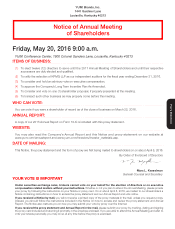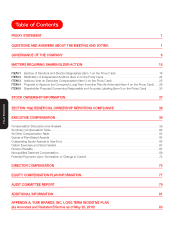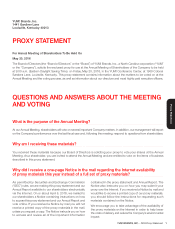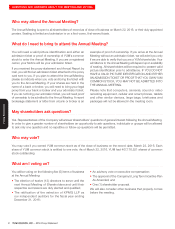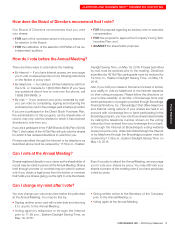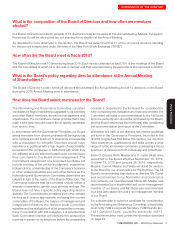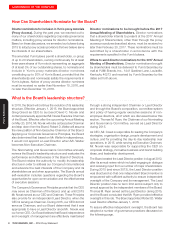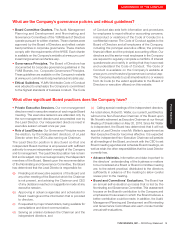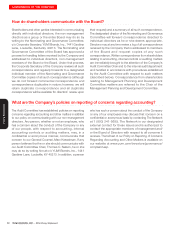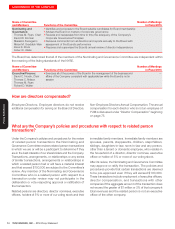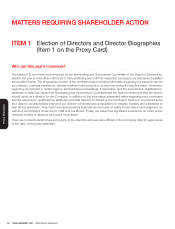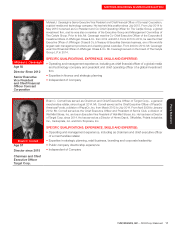Pizza Hut 2015 Annual Report Download - page 23
Download and view the complete annual report
Please find page 23 of the 2015 Pizza Hut annual report below. You can navigate through the pages in the report by either clicking on the pages listed below, or by using the keyword search tool below to find specific information within the annual report.
YUM! BRANDS, INC.-2016Proxy Statement 9
Proxy Statement
GOVERNANCE OF THE COMPANY
What are the Company’s governance policies and ethical guidelines?
•
Board Committee Charters. The Audit, Management
Planning and Development and Nominating and
Governance Committees of the YUM Board of Directors
operate pursuant to written charters. These charters were
approved by the Board of Directors and reflect certain
best practices in corporate governance. These charters
comply with the requirements of the NYSE. Each charter
is available on the Company’s website at www.yum.com/
investors/governance/charters.asp.
•
Governance Principles. The Board of Directors has
documented its corporate governance guidelines in the
YUM! Brands, Inc. Corporate Governance Principles.
These guidelines are available on the Company’s website
at www.yum.com/investors/governance/principles.asp.
•
Ethical Guidelines. YUM’s Worldwide Code of Conduct
was adopted to emphasize the Company’s commitment
to the highest standards of business conduct. The Code
of Conduct also sets forth information and procedures
for employees to report ethical or accounting concerns,
misconduct or violations of the Code of Conduct in a
confidential manner. The Code of Conduct applies to the
Board of Directors and all employees of the Company,
including the principal executive officer, the principal
financial officer and the principal accounting officer. Our
directors and the senior-most employees in the Company
are required to regularly-complete a conflicts of interest
questionnaire and certify in writing that they have read
and understand the Code of Conduct. The Code of
Conduct is available on the Company’s website at
www.yum.com/investors/governance/conduct.asp.
The Company intends to post amendments to or waivers
from its Code (to the extent applicable to the Board of
Directors or executive officers) on this website.
What other significant Board practices does the Company have?
•
Private Executive Sessions. Our non-management
directors meet in executive session at each regular Board
meeting. The executive sessions are attended only by
the non-management directors and are presided over by
the Lead Director. Our independent directors meet in
executive session at least once per year.
•
Role of Lead Director. Our Governance Principles require
the election, by the independent directors, of a Lead
Director when the CEO is also serving as Chairman.
The Lead Director position is structured so that one
independent Board member is empowered with sufficient
authority to ensure independent oversight of the Company
and its management. The Lead Director position has no term
limit and is subject only to annual approval by the independent
members of the Board. Based upon the recommendation
of the Nominating and Governance Committee, the Board
has determined that the Lead Director is responsible for:
(a) Presiding at all executive sessions of the Board and
any other meeting of the Board at which the Chairman
is not present, and advising the Chairman and CEO
of any decisions reached or suggestions made at any
executive session,
(b) Approving in advance agendas and schedules for
Board meetings and the information that is provided
to directors,
(c) If requested by major shareholders, being available for
consultations and direct communication,
(d) Serving as a liaison between the Chairman and the
independent directors, and
(e) Calling special meetings of the independent directors.
As noted above, Robert D. Walter, our current Lead Director,
will become Non-Executive Chairman of the Board upon
Mr.Novak’s retirement as Executive Chairman at our Annual
Meeting of Shareholders on May 20, 2016. Since Mr. Walter
is independent, the Board has determined that it will not
appoint a Lead Director once Mr. Walter’s appointment as
Non-Executive Director becomes effective. It is expected
that the independent Non-Executive Chairman will preside
at all meetings of the Board, and work with the CEO to set
Board meeting agendas and schedule Board meetings, as
well as retain the other responsibilities that the Lead Director
currently has.
•
Advance Materials. Information and data important to
the directors’ understanding of the business or matters
to be considered at a Board or Board Committee meeting
are, to the extent practical, distributed to the directors
sufficiently in advance of the meeting to allow careful
review prior to the meeting.
•
Board and Committees’ Evaluations. The Board has
an annual self-evaluation process that is led by the
Nominating and Governance Committee. This assessment
focuses on the Board’s contribution to the Company and
emphasizes those areas in which the Board believes a
better contribution could be made. In addition, the Audit,
Management Planning and Development and Nominating
and Governance Committees also each conduct similar
annual self-evaluations.


